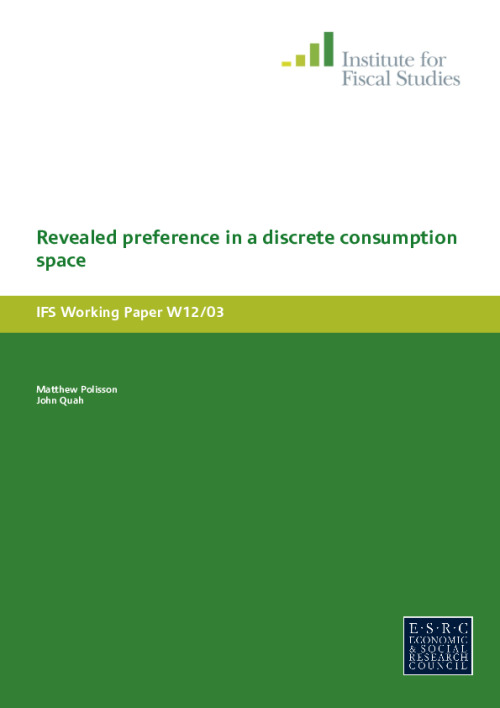Downloads

wp1203.pdf
PDF | 420.27 KB
<p>We show that an agent maximizing some utility function on a discrete (as opposed to continuous) consumption space will obey the generalized axiom of revealed preference (GARP) so long as the agent obeys cost efficiency. Cost efficiency will hold if there is some good, outside the set of goods being studied by the modeler, that can be consumed by the agent in continuous quantities. An application of Afriat's Theorem then guarantees that there is a strictly increasing utility function on the discrete consumption space that rationalizes price and demand observations in that space.</p>
Authors

Research Associate University of Leicester
Professor of Economics at the University of Leicester. His research interests are in applied microeconomics and microeconomic theory.

John Quah
Working Paper details
- DOI
- 10.1920/wp.ifs.2012.1203
- Publisher
- IFS
Suggested citation
Polisson, M and Quah, J. (2012). Revealed preference in a discrete consumption space. London: IFS. Available at: https://ifs.org.uk/publications/revealed-preference-discrete-consumption-space (accessed: 30 June 2024).
More from IFS
Understand this issue

Sure Start achieved its aims, then we threw it away
15 April 2024

Social mobility and wealth
12 December 2023

How important is the Bank of Mum and Dad?
15 December 2023
Policy analysis

How do the last five years measure up on levelling up?
19 June 2024

Making mortgage guarantees permanent will help some first-time buyers, but only if they can afford a bigger mortgage
6 June 2024

What has happened to earnings since 2019?
31 May 2024
Academic research

Income inequality in Ireland, 1987–2019
28 June 2024

Components of the evolution of income inequality in Sweden, 1990–2021
28 June 2024

Labour market inequality and the changing life cycle profile of male and female wages
15 April 2024